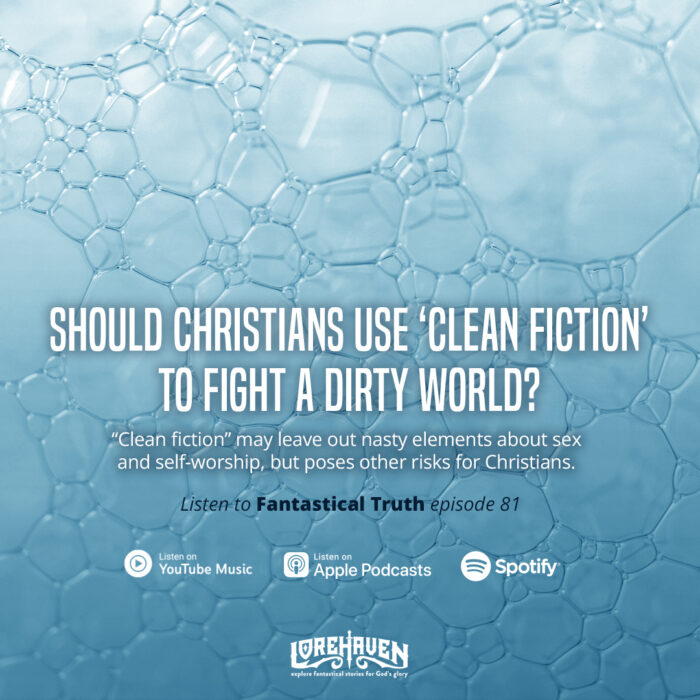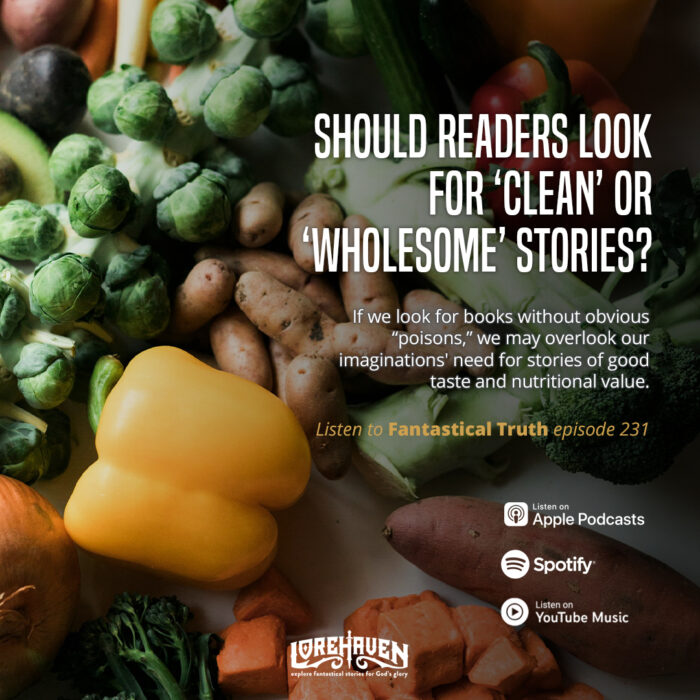231. Should Readers Look for ‘Clean’ or ‘Wholesome’ Stories?
Podcast: Play in new window | Download (Duration: 1:07:50 — 63.4MB) | Embed
Christian parents often ask whether stories for their kids have bad words and bad language. Today they’re also asking: “Does this story have Agenda?” Often they look for clean stories, that is, stories empty of objectionable elements. But do readers of all ages really need only clean fiction? Instead of stopping at minimalist stories that don’t contain obvious poisons, shouldn’t we also seek stories that are full of nutrients—stories that are wholesome?
Episode sponsors
- Audio-Epic.com: “1232” audio drama podcast
- Return of the Lost Ones by David Liberto
- Above the Circle of Earth: prebuy this sci-fi
Mission update
- Lorehaven recently reviewed Sea and Soul as well as The Skin Map
- Subscribe free to get updates and join the Lorehaven Guild
Concession stand
- We love to approach this “clean” topic from many different directions.
- We’ve already asked whether this cleanliness is really next to godliness.
- But this isn’t that episode. Here we ask if we should stop at clean fiction.
- Or do we build on that foundation and seek fiction that’s even better?
- We start by offering an alternative word for what many Christians want.
- We’re talking mainly about casual conversation, not Official Book Policy.
- So if you seek out “clean fiction,” keep at it! But be challenged anyhow.
- Labels help shape our imaginations, giving sound/ideas to assumptions.
- It may seem odd to say “this word, not that,” but we’ll explain why here.
 Quotes and notes
Quotes and notes
- 81. Should Christians Use ‘Clean Fiction’ to Fight a Dirty World?
- 155. How Might Sentimentalism Threaten Christian Fiction?
- 169. Should Christian Stories Feel Free to Show Cussin’ and Fightin’?
1. What do we mean by ‘clean fiction’?
- The word “clean” brings a many images and cultural assumptions.
- For our last “clean” episode 81, we used an image of shiny soap bubbles.
- We may also think about spiritually “clean” foods or natural ingredients.
2. What do we mean by ‘wholesome’ fiction?
- Where clean implies absence of bad things, wholesome is opposite.
- Wholesome implies good, nutritious ingredients that help you grow.
- Clean means “isn’t bad.” Wholesome means better: “is actively good.”
3. Do we disregard clean and seek the wholesome?
- Stephen believes: yes, again, in how we casually talk about stories.
- Many readers believe that clean quickly denotes anything offensive.
- But many other readers see the exact opposite: clean means false.
- That’s because, clearly, real life isn’t clean, and stories are best realistic.
- But critics should note: real life does include clean elements, after all.
- This reality is best described by the word wholesome; it can be unifying.
- Wholesome also encourages us to consider different maturity levels.
- Most folks assume clean means “suitable for kids”; wholesome can vary.
- Scripture itself would not be considered clean, but it is wholesome.
- God, the Author, has given us His word not just to keep out bad stuff.
- He invites us into His true Story that is about growing to be like Jesus.
Com station
Top question for listeners
- What stories would you call wholesome as opposed to clean?
John used the Lorehaven.com feedback form for episode 230:
You mentioned your next episode will be about wholesome stories. We are Christians and have homeschooled our awesome daughter her whole life. She is 15 now and besides her other many interests, she still loves reading. We were lucky enough to discover a curriculum called The Good and the Beautiful. The reading curriculum focuses on stories that are good, beautiful, wholesome, and I would say edifying. Focusing on Christian character and values. (This is a Mormon organization. The great majority of the curriculum is Bible-based.) There is a whole library for readers from preschool to high school level. I highly recommend the reading library, if not the whole curriculum, to anyone looking for great books for their kids.
So did Cody, who had thoughts about a mentioned movie:
I read Joseph Holmes’s piece on The Front Room and then I read the Wikipedia synopsis and now I’m really confused. According to Holmes, part of the movie’s message is that Christianity disempowers women and Paganism empowers them. But the premise is that Christianity somehow gives the female villain superpowers and until the end, the Pagan heroine is at a loss as to how to deal with her. Say what?































Hi, I’m the Cody that did the comment about The Front Room and I feel like you misunderstood what I was saying. The Wikipedia summary wasn’t saying that the movie portrays Christianity positively. The summary was all about events, not themes. I was saying that the plot contradicted the movie’s message that “Christianity is bad because it takes away power from women” since what happens is more like, “Christianity is bad because it gives women power-evil power!”
That being said, I don’t typically agree with Joseph Holmes’s takes on the themes of movies. It’s possible The Front Room is actually saying that both Paganism and Christianity are wrong or something like that. I also wouldn’t be surprised though if it’s just a silly movie whose plot doesn’t gel with its stated message. Those exist.
Ah ok, thanks for clarifying things, Cody! Sounds like the movie wasn’t sure what it was trying to say.